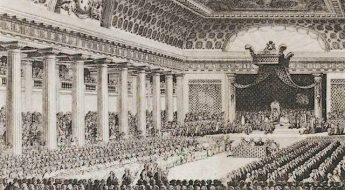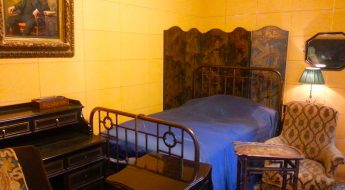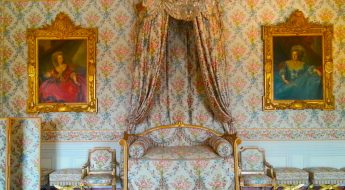La Maréchale d’Aubemer, Nouvelle du XVIIIème Siècle, or The Widow of Field Marshal d’Aubemer: A Novella of the 18th Century, posthumously published in 1867, is a novel by the author and memoirist Madame de Boigne, born Adélaïde d’Osmond (1781-1866). Mine is the first English translation, available here for the first time anywhere.
In Chapter 9, Henri d’Estouteville helps Lionel de Saveuse hatch a plan. Perhaps he has one of his own?
THE WIDOW OF FIELD MARSHAL D’AUBEMER: A NOVELLA OF THE 18TH CENTURY
CHAPTER NINE
Plans for Strategic Gallantry
Hardly had he returned to Paris when Lionel hastened to keep his engagement to attend the exquisite luncheon — to which invitations were highly sought after by all the most elegant young men — that Henri d’Estouteville gave on Mondays. The habitual guests were a little startled by this new recruit, but d’Estouteville was their king and could be permitted any eccentricity. The luncheon finished, Lionel expressed his regret at not being able to attend the next one. He was going away.
“Where are you going?” inquired Henri casually.
“To take Mme de Saveuse back to her mother, but I shall come back immediately after for important business that will keep me here for a long time.”
Henri looked at Lionel fixedly with a sort of bantering amazement that began to embarrass him. Then, throwing himself back in his chair, he broke into laughter: “You have important business in Paris and you take Mme de Saveuse back to Limousin! Oh, country innocence! You are nowhere more evident than in this! Truly, old chap, I thought you were really one of us. But you see, gentlemen, we insulted his ingenuousness in thinking him so clever.”
Lionel would have liked very much to get angry; however, disconcerted by the peremptory manner that Henri was imposing on him, he contained himself and asked quite humbly for an explanation of these words that troubled him. After allowing himself to be entreated for a time, d’Estouteville consented to show him how it should not be believed that, behind the mask of frivolity, men of the world neglected their ambitions or their interests. All of them, with Henri at their head, had admired the diplomacy deployed by Lionel, who, on the pretext of a mean twopenny lawsuit, had skillfully come within reach of the Maréchale’s immense inheritance, and the consequence that her favour could confer, by bringing into her orbit a young woman, who, singularly well prepared by her husband, had monopolized her aunt from the very first. But now they had to climb down from the lofty heights of such a conception to discover that there was nothing more to this excursion than a provincial couple taking advantage of a petty squabble to come and admire the wonders of the capital in order to recount them back in Limoges! D’Estouteville laughed while Lionel seethed deep within his heart. The other guests having dispersed, the conversation between the two young men became more serious. Before they parted, it was agreed that there was only one matter of importance for the Saveuses: to subjugate the Maréchale entirely. The business was already in a very fair way. Henri allowed himself to be told by Lionel how imperious, demanding, and egotistical she was. He added for his part that she was capricious and mercurial. Her niece was quite apparently her natural heiress, but everyone had seen several years earlier how she had adopted the Chevalier d’Aubemer; a similar fancy for someone else could strike her. It was thus necessary to cultivate the preference that Mme de Saveuse had the talent of inspiring in the old lady and to keep it up by her incessant presence and attentions. Lionel humbly confessed his fear of not being able to make his wife enter into his views; she loved her aunt, but much less than her mother, and dreamed only of returning to Saveuse.
“Well, then, so much the better, my dear fellow,” replied d’Estouteville. “You have too much wit and judgement not to know how to lead your little wife without her being aware of it, and unseen instruments are often the most effective in an intelligent hand.”
All things considered, it was decided there and then that the Saveuses would not go back to Limousin, and that by the next winter Lionel’s artfulness, by succeeding in installing himself as master of the Hôtel d’Aubemer, should make of him the most sought after man in Paris.
The reconciliation between d’Estouteville and the Princesse de Montford ostensibly took place at the same time. Lionel took it in rather ill humour, but did not dare to show it to these two leaders of fashion. At a grand dinner in the Hôtel de Montford and at several of the Maréchale’s soirées, Henri’s eager ardor was too striking not to be noticed, and this revival of feeling reestablished a connection that was doubted no more. Gudule often heard it joked about and Princesse Simon’s name brought back memories too painful for these conversations to be anything but eminently disagreeable. She had had no occasion to show d’Estouteville any coldness, for he paid little attention to her; however, in the depths of her soul she felt a great coldness towards a man capable of handing over his heart to a person as false and artificial as Princesse Simon. The Maréchale, for her part, observed the two young people and was fully reassured as to the growing inclination for each other that she had feared.
Princesse Simon had got too much good use out of Lionel to let go entirely of the chain by which she kept him at her feet, and accorded him sufficient cajolery to keep him there. She would have liked to be rid of Mme de Saveuse, and pressed for the departure to Limousin, but Lionel was nailed down in Paris by Henri’s mocking laughter and the best efforts of the Princesse could not make him decide to send his wife away from the Maréchale. He would take care all the same not to let Gudule glimpse the deeper policy behind his decision; a secret instinct warned him that she would be revolted by it. Had d’Estouteville not assured him that, if skillfully led, the little wife would play her role the better the less she understood it? Always uneasy at the superiority that he could not prevent himself from recognizing in his wife, Lionel was extremely flattered that Henri placed him so proudly in the front rank.
Alerted by Mme d’Aubemer’s letter, Caroline had urged the Baronne de Saveuse to recall her son forthwith, but the Baronne, with her usual bullheaded obstinacy, affirmed that Lionel very much desired to return, but if he remained in Paris, it was because his presence there was effectively indispensable. Caroline, unable to budge her from this line of thought, wrote to her daughter that her duty must be to remain at M de Saveuse’s side. The saddened Gudule thus had to obey the orders to this effect that were arriving from all sides. Meanwhile, she was withering, her lovely colouring was fading, and her good humour was spoiling. Mme d’Aubemer noticed these changes and attributed them to the worries caused by her husband’s conduct.
Seeing her very pale one morning, she said, “Are you unwell, Gudule?”
“A little, Aunt. This beautiful sunshine makes me sad amid the walls of Paris.”
“Well, then, let us go to Magnanville1; there you will at least find some trees and water in default of your mountains.”
“Oh, yes, Aunt! Let us go to Magnanville! Mama has told me so much about it! But, Aunt, Mama thinks that I must not leave Lionel?”
“Very well, Lionel shall come with us.”
“Will he want to?”
And the darkening tint that appeared on Mme de Saveuse’s lovely face confirmed the Maréchale in the idea that her niece’s melancholy was due to the infidelity of her dolt of a husband, who seemed to her all the more disagreeable because of it.
D’Estouteville had resumed the habit of spending a part of each evening at the Maréchale’s. Amply reassured on the score of the suspicions she had for a moment entertained, she invited him to Magnanville. He accepted politely, but without showing any eagerness.
Notes:
1. Magnanville: the Maréchale’s chateau in the countryside.


















Leave a Comment